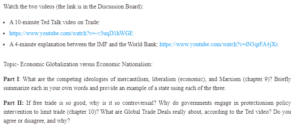Economic Globalization versus Economic Nationalism
Part I
Mercantilism, liberalism, and Marxism are three different ideologies with competing views on economics and the role of the state in the economy.
Mercantilism: This is an economic theory that was popular in Europe during the 16th to 18th centuries. It is based on the idea that a country’s wealth is measured by the amount of gold and silver it possesses. Mercantilists believed that the government should intervene in the economy to increase exports and reduce imports in order to accumulate more gold and silver. This led to policies such as tariffs and subsidies that protected domestic industries and promoted exports. Mercantilists believed that a country’s economic power was essential to its political and military power.
Do you need any help for completing your assignment ? Contact us at eminencepapers.com. We endeavor to provide you with excellent service.
Liberalism (economic): This is an economic theory that emphasizes the importance of free markets and individual rights. It emerged in the late 18th and early 19th centuries as a response to mercantilism. Liberals believe that the government should not interfere in the economy and that free competition will lead to the most efficient use of resources and the greatest prosperity for all. They advocate for free trade and minimal government regulation of business. Liberals believe that individual freedom and economic growth are interconnected and that a laissez-faire economy will lead to greater prosperity and well-being for all.
Marxism: This is a political and economic theory developed by Karl Marx in the 19th century. It emphasizes the importance of class struggle and the need for a socialist revolution to overthrow capitalist society. Marxists believe that the state should control the economy and that private property should be abolished. They advocate for a planned economy in which the means of production are owned and controlled by the workers rather than by capitalists. Marxists argue that capitalism creates inequality and exploitation and that socialism is the only way to achieve true economic and social justice.
In summary, while mercantilism and liberalism represent different historical eras and economic contexts, they both advocate for different forms of government intervention in the economy. Marxism, on the other hand, represents a radical departure from both mercantilism and liberalism, advocating for the complete abolition of private property and the establishment of a socialist economy.
Part 2
Free trade is good, but it is a controversial issue because it involves the removal of barriers to trade, such as tariffs, quotas, and regulations, which can have both positive and negative effects on various groups within a society. While free trade can lead to lower prices, increased efficiency, and greater global economic integration, it can also lead to job losses, lower wages, and increased competition for domestic industries.
Governments engage in protectionism and policy intervention to limit trade for several reasons, including protecting domestic industries and jobs, promoting national security, and addressing environmental or labor concerns. These policies can take various forms, such as tariffs, subsidies, and regulations, and can have both intended and unintended consequences.
Global trade deals, such as the Trans-Pacific Partnership (TPP) and the North American Free Trade Agreement (NAFTA), are designed to reduce trade barriers and promote greater economic integration among participating countries. These deals can have significant implications for global trade and can be controversial, as they can affect various industries and groups differently. According to the Ted video, global trade deals are also about geopolitical power and influence, as they can strengthen alliances and shape global economic relationships.
In my opinion, while free trade can have significant benefits, it can also be controversial, and governments often engage in protectionism and policy intervention to address various economic and social concerns. Global trade deals are complex agreements that can have far-reaching implications for various stakeholders and are not solely focused on economic benefits.
References
Irwin, D. A. (2017). Free trade is under fire. Princeton University Press.
Rodrik, D. (2011). The globalization paradox: Democracy and the future of the world economy. W.W. Norton & Company.
Stiglitz, J. E. (2002). Globalization and its discontents. W.W. Norton & Company.
World Trade Organization. (2019). World Trade Report 2019: The future of services trade. Geneva: World Trade Organization.
Ted Talks. (2018). The future of globalization: Moving away from neoliberalism. [Video file]. Retrieved from https://www.ted.com/talks/richard_baldwin_the_future_of_globalization_moving_away_from_neoliberalism
Krugman, P. (1987). Is free trade a pass? The Journal of Economic Perspectives, 1(2), 131-144.
Hillman, A. L. (2018). The political economy of protectionism. Annual Review of Political Science, 21, 315-331.
ORDER A PLAGIARISM-FREE PAPER HERE
We’ll write everything from scratch
Question
Watch the two videos (the link is in the Discussion Board):

Economic Globalization versus Economic Nationalism
- A 10-minute Ted Talk video on Trade:
- https://www.youtube.com/watch?v=-v3uqD1hWGE
- A 4-minute explanation between the IMF and the World Bank: https://www.youtube.com/watch?v=lN3qrFA4jXc
Topic- Economic Globalization versus Economic Nationalism:
Part I: What are the competing ideologies of mercantilism, liberalism (economic), and Marxism (chapter 9)? Briefly summarize each in your own words and provide an example of a state using each of the three.
Part II: If free trade is so good, why is it so controversial? Why do governments engage in protectionism policy intervention to limit trade (chapter 10)? What are Global Trade Deals really about, according to the Ted video? Do you agree or disagree, and why?

